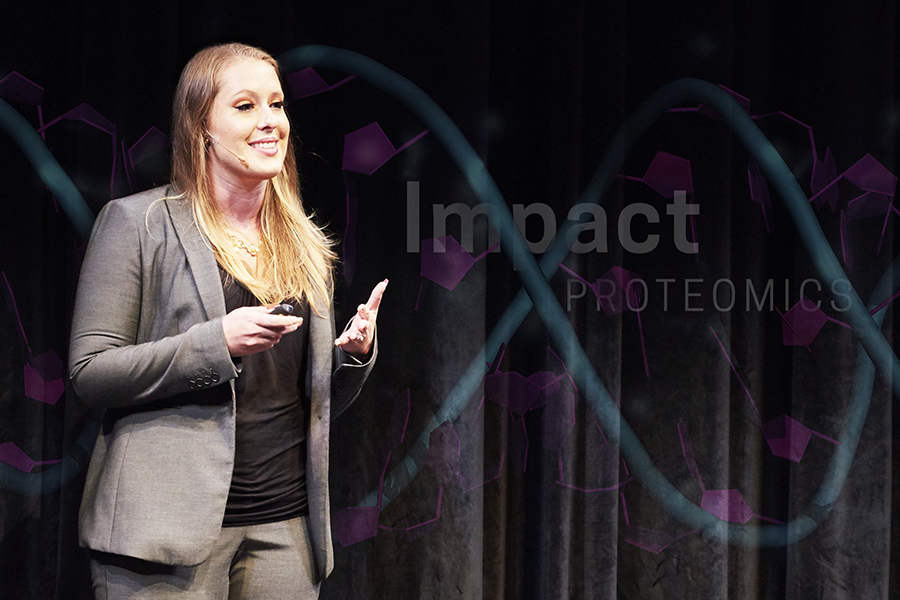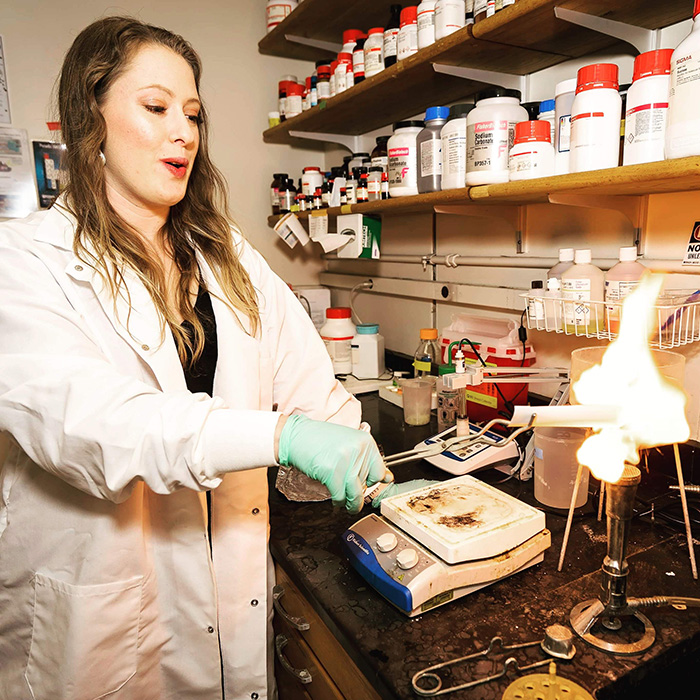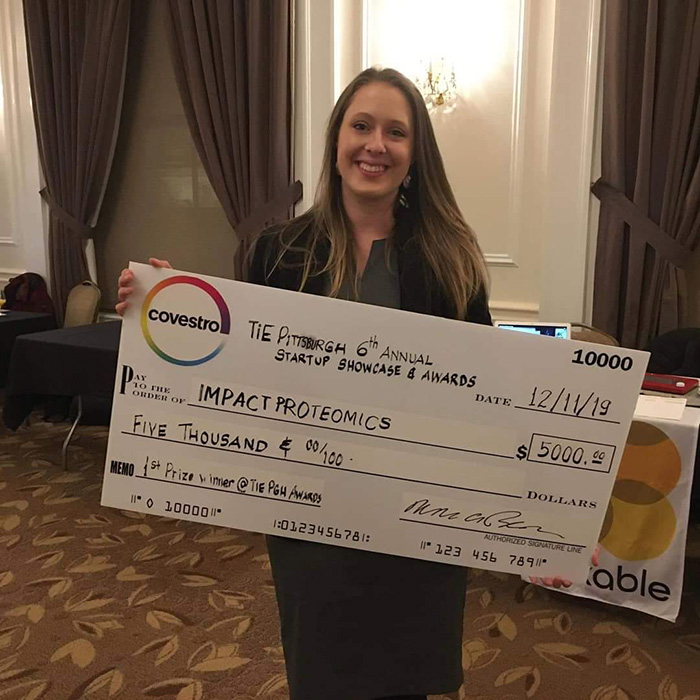
A Protein Pioneer
Alumna Amber Lucas’ protein sample kits help researchers get critical therapies and diagnostic tools to market quickly and safely
By Amanda S.F. Hartle
Amber Lucas knows from years of hands-on lab experience that preparing samples for research can be time-consuming, tedious and temperamental.
The Mellon College of Science alumna co-founded Impact Proteomics to accelerate and simplify the monotonous task — saving precious time for researchers working to pioneer life-saving scientific breakthroughs.
“Our kits take the work out of the front end of biomarker and drug discovery workflows, so researchers can get useful data faster, be more confident in their results, and ultimately get valuable drug therapies and diagnostic tools to market faster,” said Amber, who graduated from CMU in 2018 with a doctoral degree in biological sciences and serves as the company’s chief executive officer.
Beyond their affordable protein sample prep kits, Amber and her team are using their company’s technology for their own research into discovering treatments for overlooked disorders.
“We’re hoping to use our tool to make a difference in the world. That’s our goal,” Amber says.
"CMU was so collaborative and friendly, and the department offered a lot of one-on-one time with your advisor. It was the perfect size for me."
Steps Toward Success
As a first-generation college student, Amber admits she was intimidated about pursuing her doctorate, but she immediately knew Carnegie Mellon was the place for her to achieve her goals.
“CMU was so collaborative and friendly, and the department offered a lot of one-on-one time with your advisor,” she says. “It was the perfect size for me.”
She started working in Professor Jonathan S. Minden’s lab in the Biological Sciences Department. Among other research, the lab uses proteomics, the analysis of all proteins in a cell, tissue or organism, to study how organisms adapt to mutational changes.
In 2015, Minden, who serves as the company’s co-founder and chief scientific officer, shared an idea with Amber that — after four years of trial, error and technological pivots — would lead to Impact Proteomics.
Once they settled on a technology that appeared promising, Amber signed on to the National Science Foundation’s Innovation Corps program in 2017. The federal I-Corps program pairs a customer and industry discovery process, completed through experiential learning, with first-hand investigation of industrial practices to help participants assess the potential of their inventions for the scientific marketplace.
After the program’s seven-week whirlwind tour of 100 face-to-face interviews with potential customers, she knew the company’s product had value and took the plunge into entrepreneurship.
“I did not picture myself in this role, but one of the things that’s true about people who get their Ph.D. is that you are a lifelong learner,” Amber says. “I knew if I could learn it, I could do it.”
"I definitely wouldn’t be an entrepreneur if not for the Swartz Center, and our technology wouldn’t exist without the collaborative, brainstorming environment in Mellon College of Science."
From Idea to Marketplace
After the I-Corps program and secure in the potential of her protein sample prep kit, Amber set out to perfect it and simplify the crucial first step in many research labs. Proteins stand at the center of more than 90% of medicinal treatments but discovering just the right protein can take years of sifting and significant funding. The kit uses protein chemistry and a sequence of chemicals to help researchers to label and extract proteins more efficiently.
She was awarded a 2017 Innovation Fellowship from the Swartz Center for Entrepreneurship that provided the company with startup funding, education and mentorship. Coupled with the synthesis expertise from the chemistry department, the strength of the interdisciplinary network at CMU propelled Impact Proteomics to market.
“Everything I learned about being a good scientist, writing about science, how to be an entrepreneur, how to create a network and really pull from your resources, I learned at Carnegie Mellon,” Amber says. “I definitely wouldn’t be an entrepreneur if not for the Swartz Center, and our technology wouldn’t exist without the collaborative, brainstorming environment in Mellon College of Science.”
The company sold its first kit in June 2019. After a three-month hiatus due to the pandemic, Amber is back in the lab — harnessing her company’s technology to find biomarkers for complex poorly understood autoimmune disorders that affect more than 7% of Americans each year.
“People don’t really know why you get them, so if you can help predict who will be affected, doctors will be able to catch them faster and prevent a lot of irreversible damage,” Amber says.
“We have this platform now that as we grow, we can begin to address a bunch of different things in various fields. It’s not just a company for us. It’s a tool we can use to have an impact for good in the world.”

